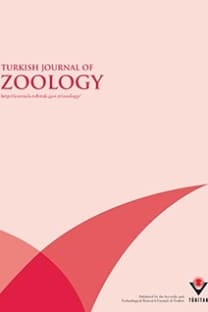The Effects of Toxic Aluminium and Low pH on Gill Development of Rainbow Trout ( Oncorhynchus mykiss, Walbaum) Larvae.
In this study, the gill development of rainbow trout ( Oncorhynchus mykiss Walbaum) larvae exposed to toxic aluminium (200 ?g/L), those exposed low pH (4.5) alone and those exposed to both for 30 days were investigated under scanning electron microscopy. General appearance of gills, filament and lamella lengths and the number of lamellae per filament were determined in order to evaluate the effects of these toxicants on gill development. In addition, the death rates and general conditions of larvae were observed. In larvae exposed to low pH alone and in those exposed to aluminium alone, a slight thickness in the apical part of the filaments, shorter lamellae and filament lengths and reduced numbers of lamellae per filament were found. But these findings statistically were not significant (P>0.05) compared with control. In larvae exposed to the combined effects of low pH and aluminium, shortened and thickened filaments, fusion of filaments and lamellae and low numbers of lamellae per filament were determined. Filament and lamella lengths and the numbers of lamellae per filament in this larva group were significantly lower (P
Anahtar Kelimeler:
Oncorhynchus mykiss, rainbow trout, pH, aluminium, gill development.
The Effects of Toxic Aluminium and Low pH on Gill Development of Rainbow Trout ( Oncorhynchus mykiss, Walbaum) Larvae.
In this study, the gill development of rainbow trout ( Oncorhynchus mykiss Walbaum) larvae exposed to toxic aluminium (200 ?g/L), those exposed low pH (4.5) alone and those exposed to both for 30 days were investigated under scanning electron microscopy. General appearance of gills, filament and lamella lengths and the number of lamellae per filament were determined in order to evaluate the effects of these toxicants on gill development. In addition, the death rates and general conditions of larvae were observed. In larvae exposed to low pH alone and in those exposed to aluminium alone, a slight thickness in the apical part of the filaments, shorter lamellae and filament lengths and reduced numbers of lamellae per filament were found. But these findings statistically were not significant (P>0.05) compared with control. In larvae exposed to the combined effects of low pH and aluminium, shortened and thickened filaments, fusion of filaments and lamellae and low numbers of lamellae per filament were determined. Filament and lamella lengths and the numbers of lamellae per filament in this larva group were significantly lower (P
Keywords:
Oncorhynchus mykiss, rainbow trout, pH, aluminium, gill development.,
- ISSN: 1300-0179
- Yayın Aralığı: 6
- Yayıncı: TÜBİTAK
